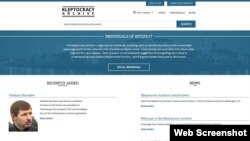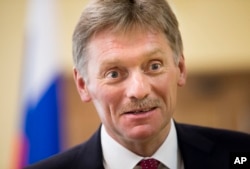Making documentary evidence of government corruption accessible to anyone with an Internet connection seems to be catching on.
Earlier this month, the International Consortium of Investigative Journalists launched a searchable public database for the Panama Papers, the more than 11.5 million documents leaked from a Panamanian law firm revealing how wealthy individuals, including government officials, used offshore accounts to hide wealth, some of it acquired illicitly.
Now comes a searchable Internet portal containing thousands of documents pertaining to official malfeasance in Russia and other former Soviet states.
'Kleptocracies'
Launched by the Hudson Institute, a Washington-based think tank, the Kleptocracy Archive provides access to a database that it says will enable users to "identify key actors in the complicated patronage and business networks that characterize kleptocracies" – a term used for governments whose officials engage in large-scale misappropriation of public funds for personal enrichment.
The Kleptocracy Archive states that while the "individuals of interest" included in its database "are associated with kleptocratic regimes for many reasons," their inclusion "does not in itself imply wrongdoing of any kind," but nonetheless is "critical to understanding how modern kleptocracies function – and the grave threats they pose to democracy."
Majority of subjects are Russian
The database currently lists 94 "individuals" (although several reputed Russian organized crime gangs are listed among the "individuals"), including two sitting presidents – Russia’s Vladimir Putin and Ukraine’s Petro Poroshenko.
While the "individuals" listed are from four countries – Russia, Ukraine, Georgia and Uzbekistan – the vast majority of them are Russian.
Look under the portal’s "Recently Added" heading and you will find the name of Vladimir Barsukov (also known as Vladimir Kumarin), who is described as "the former vice president of Petersburg Fuel Company (PTK)" and the "alleged boss" of the St. Petersburg-based Tambov criminal organization (which itself is also listed, separately, as a new entry).
Last June, Spanish prosecutors filed a criminal complaint of more than 400 pages that linked close associates of President Putin, including officials in his government, with the Tambov group. Putin held several top posts in the St. Petersburg city administration before moving to Moscow in 1996.
Connection between Kremlin, organized crime
At the Kleptocracy Archive’s launch in Washington, Karen Dawisha, author of the book Putin's Kleptocracy: Who Owns Russia? and a member of the Hudson Institute’s Kleptocracy Initiative Advisory Council, said "the biggest takeaway" from the archive’s documents is that they provide "absolute proof of the symbiosis between Russian organized crime and the Kremlin."
"What you have in the archives are documents from the FBI," Dawisha said. "You have documents from the Germans. You have documents from the Swiss. You have documents from the Austrians. And you have documents from the Spanish. All concluding this basic connection."
The Kleptocracy Archive also includes an English-language translation of a document apparently leaked from the Kremlin that was published by the Russian newspaper Kommersant immediately after Putin became president in 2000 but later removed from the newspaper’s own electronic archive.
The document detailed plans to reform the Russian presidential administration by dividing it into "open" and "closed" sections, with the apparent aim of creating the impression the government was pro-democratic and reformist, while the president and his subordinates would make all the real decisions behind closed doors.
The plan included details of possible moves against political opponents of the Kremlin and independent media similar to those Putin subsequently took.
Complex issue
David Satter, a Hudson Institute senior fellow and member of the Kleptocracy Initiative Advisory Council, who is also author of the book Darkness At Dawn: The Rise Of Russia's Criminal State, told VOA’s Russian service the archive will help Western politicians and experts develop appropriate diplomatic and other relations with representatives of Russia at all levels.
"There are always some practical issues that we have to discuss with the Russian government," Satter said. "But it is literally riddled with organized crime, so the problem before us is complex.
"We cannot do without contacts with the Russian authorities, because they preside over the destinies of millions of people. The most important thing is to know who you are dealing with and to understand who you are sitting down with at the negotiating table," he said. "One of the main weaknesses of American diplomacy is that we always see in our Russian interlocutors people who are very similar to us. But this is absolutely not the case."







